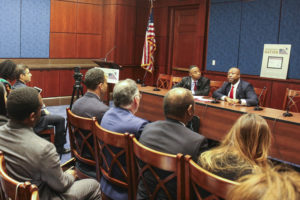The Power of Commonality
 •
•
Let’s be honest. Bipartisanship sounds good, but it is not popularly practiced. Why is that? From my vantage point, it is all based on the notion that party allegiance should not include negotiation, for that is simply conciliation. A lawyer is not necessary to critique such flawed logic, but we encourage it – whether intentionally or not – every day. Knowing this, I appreciate politicians like Senator Tim Scott (R-SC), whose Senate tenure has driven several bipartisanship efforts.
In February, I interviewed Senator Scott at Opportunity Nation’s first “Restoring the American Dream Series” event on Capitol Hill. We discussed his humble upbringings, his support of Opportunity Nation, and most importantly, his bipartisan bill – the LEAP Act – with Senator Cory Booker (D-NJ). In the moment, I was struck at both how similar I was to Senator Scott and how surreal this conversation was. Here we were on Capitol Hill, two men raised in South Carolina to disadvantaged situations, and here I was, a first-generation black college graduate interviewing the first black Senator of South Carolina.
As the conversation progressed between the Senator and I, I realized an absence of politics; everyone in the room was bonded by something deeper than our differing opinions. We all believed that the 5.3 million Opportunity Youth who are neither in school nor working and the three million of these young Americans who are living in poverty mattered most. I call this the power of commonality; it filled the room… until the event ended and we were reminded of our political worldview.
The power of commonality does not dismiss differences. After all, the goal of discovering similarities is never to encourage a melting pot where people’s differences do not matter. Rather, it simply provides a foundation of respect and acknowledgment that never diminishes any one person’s lived experiences.
Society’s connotation of allegiance is damaging, especially in an America where partisan allegiance is praised. However, allegiance is defined as “loyalty or commitment of a subordinate to a superior or of an individual to a group or cause.” It does not devalue the art of compromise and neither should we.
In these politicized times, we should all take a lesson from Senator Scott and Senator Booker, and dare to say the two words mostly likely forgotten in today’s vernacular when discussing politics with someone of a different allegiance: “I agree.”









